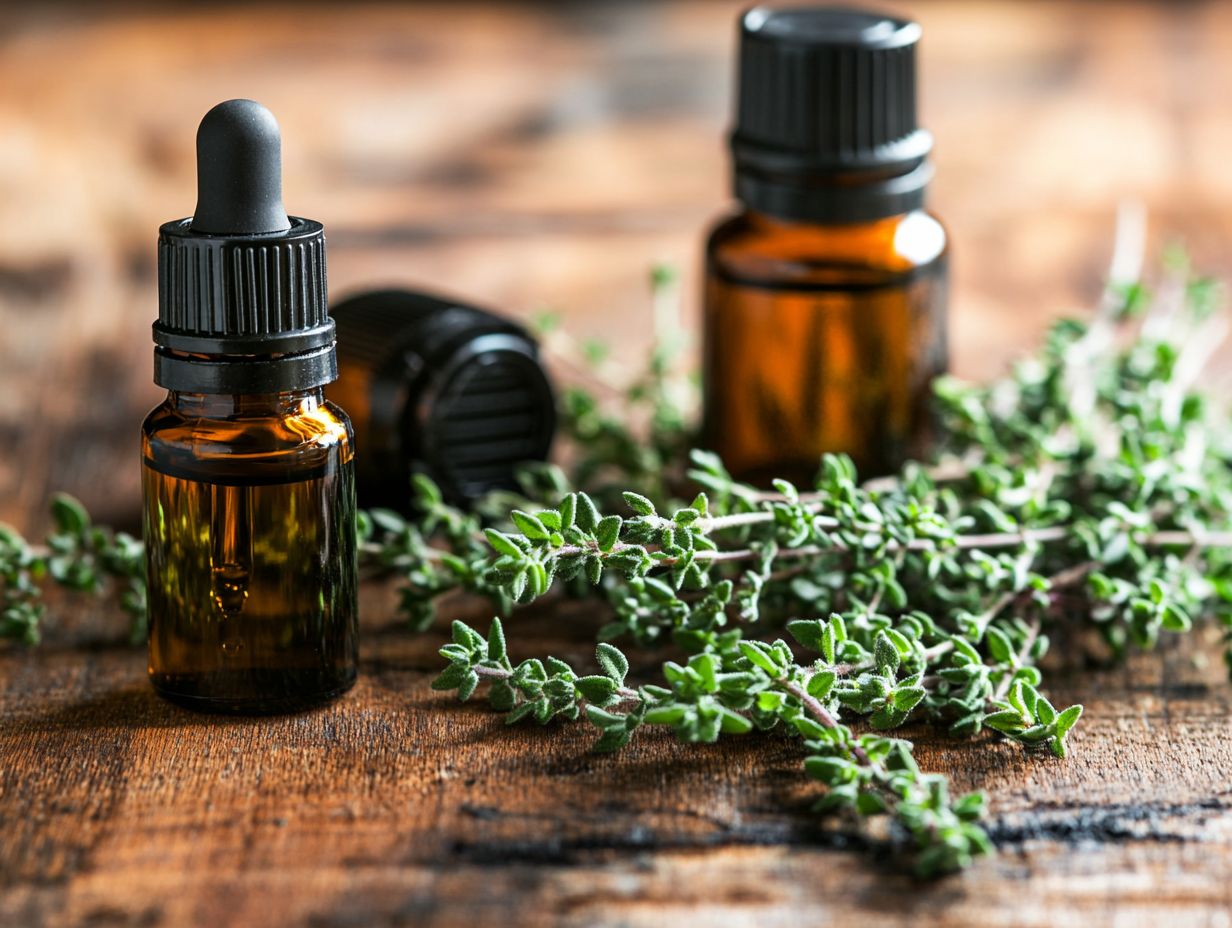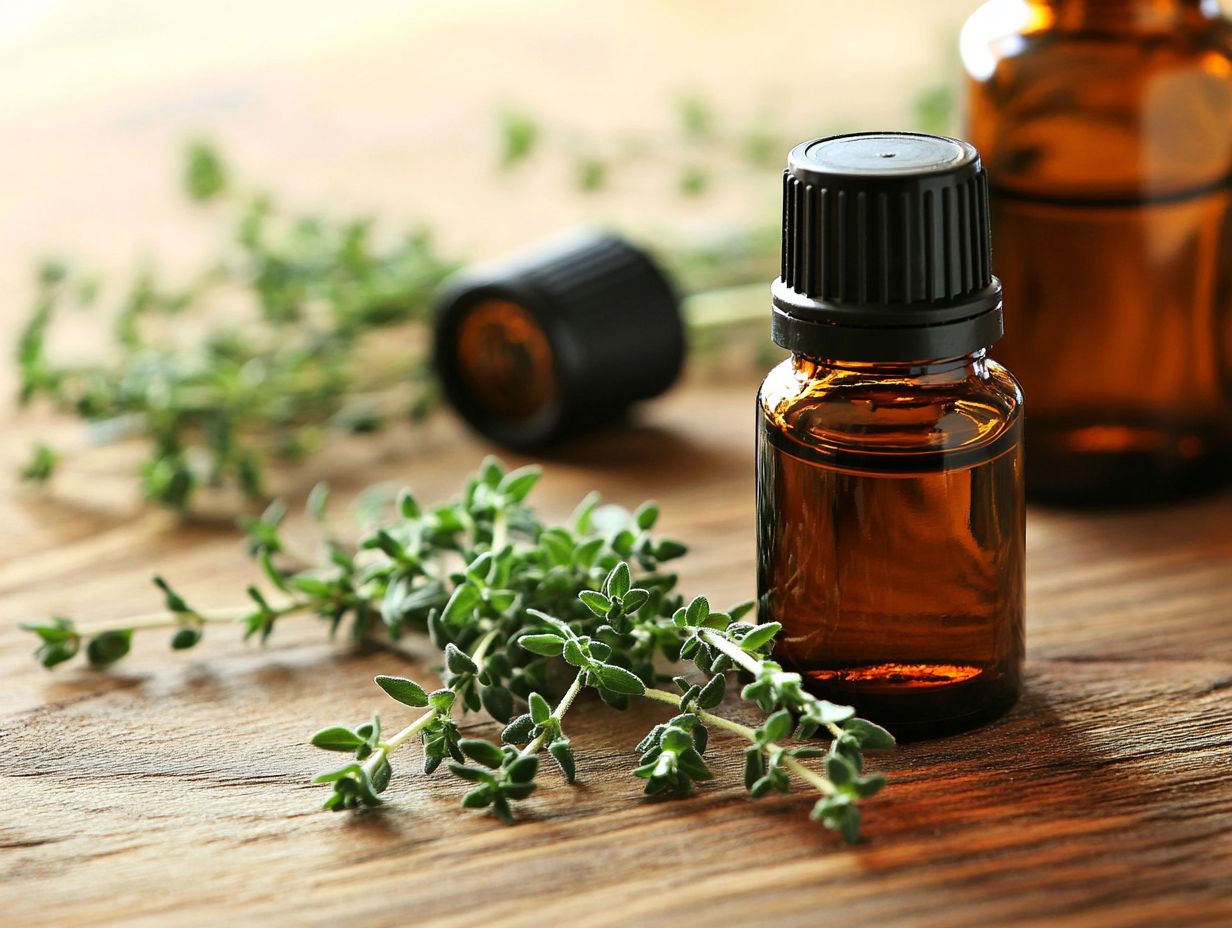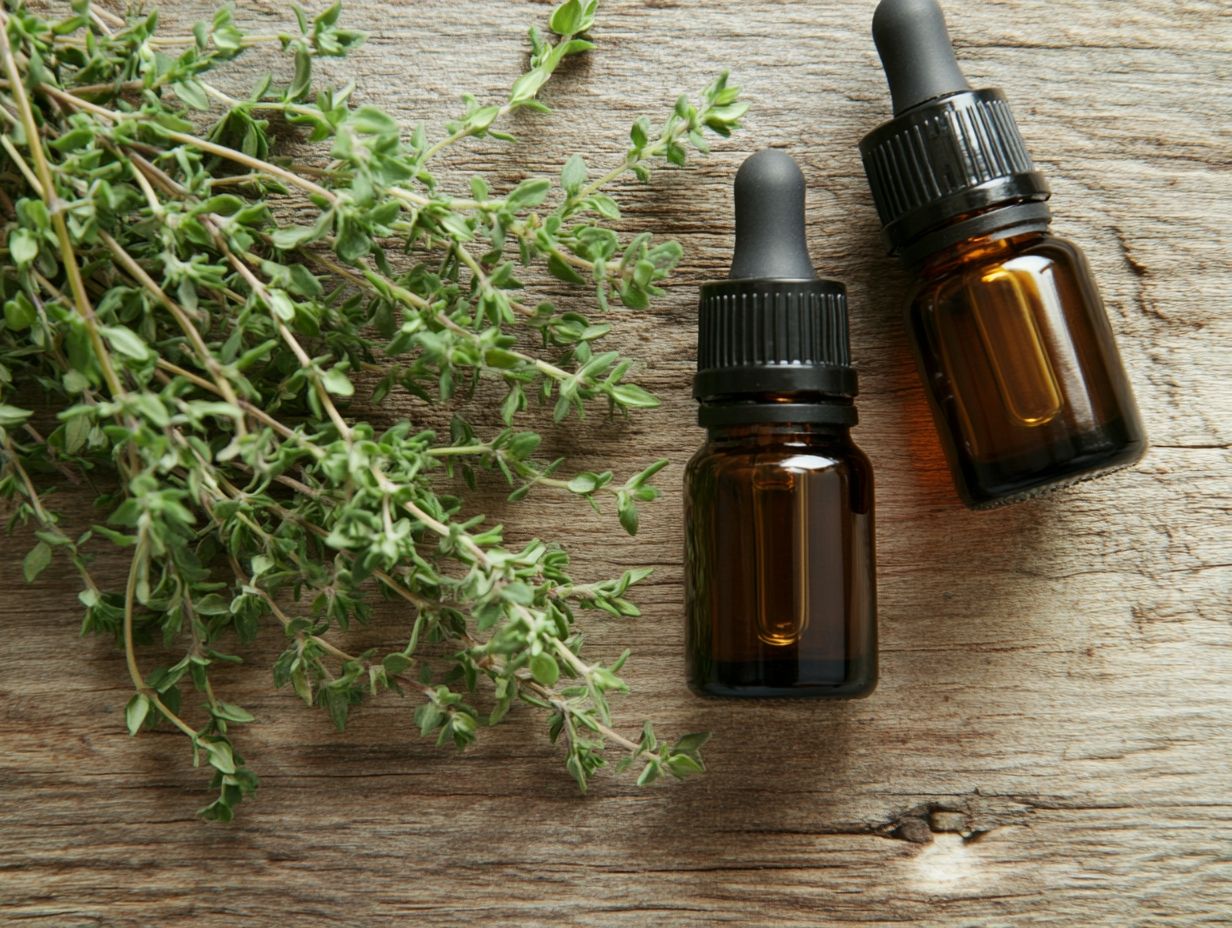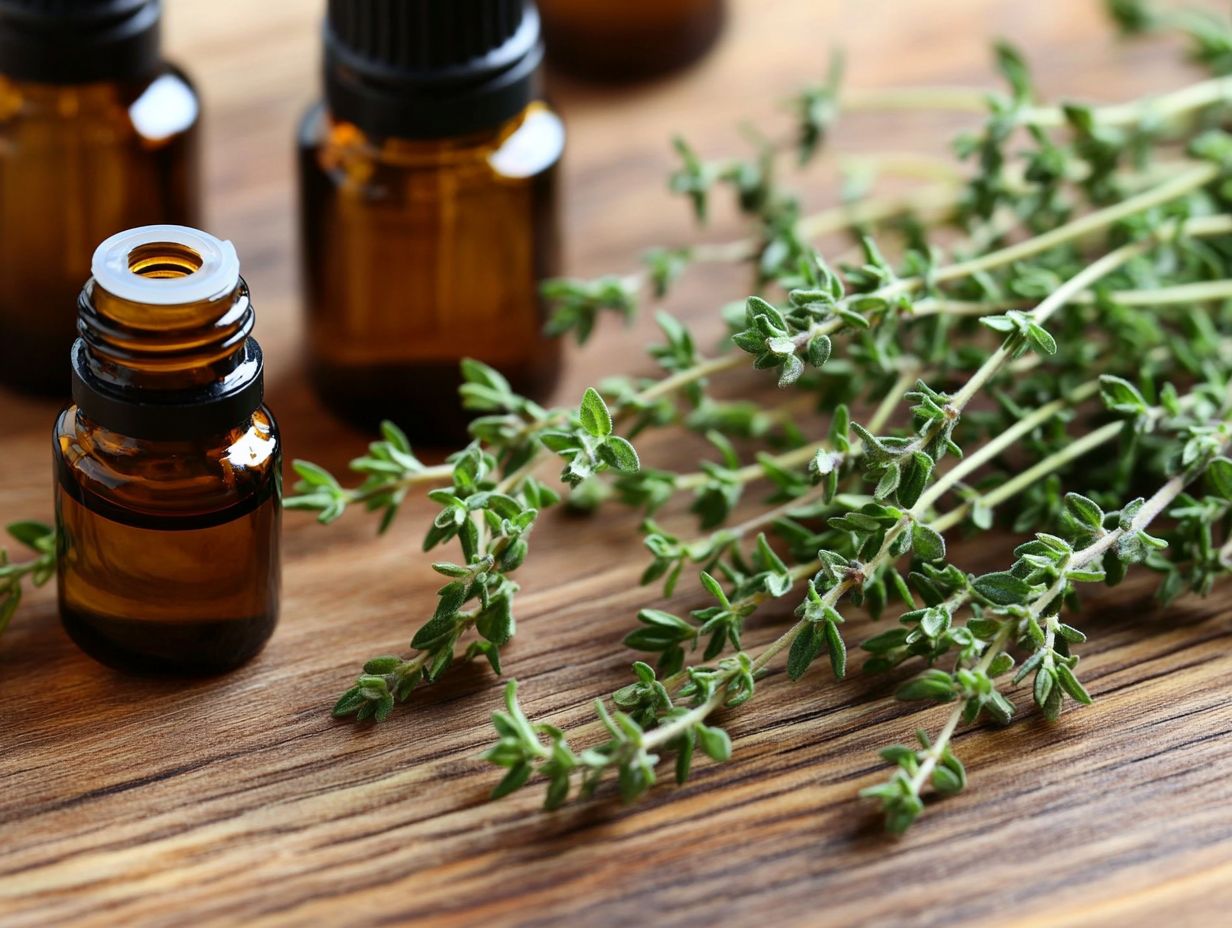Thyme: Medicinal Uses and Benefits
Thyme, a small yet powerful herb, has been revered for centuries not just in the kitchen but also for its remarkable medicinal properties.
This exploration delves into the rich history and contemporary applications of thyme, uncovering its anti-inflammatory and antioxidant benefits that support your overall health.
You’ll discover various methods of utilizing thyme for medicinal purposes while considering important safety considerations. Uncover how this unassuming herb can elevate your wellness journey!
Contents
Key Takeaways:

- Thyme has been valued for centuries for its healing properties.
- Its natural compounds help tackle respiratory issues and support skin health.
- Explore different forms of thyme, like teas and oils, but remember to check for any side effects before use.
What is Thyme?
Thyme, scientifically known as Thymus vulgaris, is a remarkable Mediterranean herb that stands out for its culinary prowess and impressive nutritional profile. As you explore various cuisines around the globe, you ll find that thyme not only enhances flavors but also delivers essential nutrients that bolster your overall health.
This aromatic herb, cherished for its therapeutic benefits and vibrant aroma, has been a staple in traditional medicine for centuries.
Its origins can be traced back to the sun-kissed hills of the Mediterranean, where it flourished in the wild and was first cultivated by ancient civilizations. As a key ingredient in Mediterranean dishes, thyme’s robust flavor elevates everything from roasted meats to hearty stews.
But thyme’s significance extends far beyond the kitchen; it holds cultural importance as well. Historically, it was used in rituals and symbolized courage in various societies.
Packed with vitamins A and C, along with essential minerals like manganese and iron, thyme offers a wealth of health benefits, including antioxidant properties and immune support. This makes it a cherished ally in both culinary endeavors and holistic traditions.
Exploring Thyme’s Medicinal Uses
Thyme boasts a rich history steeped in medicinal uses. This herb emerges as a valuable asset in the realm of herbal medicine and natural health practices.
Its versatile applications highlight its potency in addressing a range of ailments while promoting overall wellness.
Traditional and Modern Applications
Historically, thyme has earned its place of honor for its therapeutic properties. Ancient Egyptians employed it for embalming, and Hippocrates prescribed it for various ailments. Today, you ll find thyme embraced in both traditional and modern health applications, showcasing its remarkable natural benefits.
This aromatic herb, part of the mint family, is not only a delight in the kitchen but also plays a significant role in herbal medicine. In ancient Rome, thyme symbolized courage and was added to baths to enhance mental clarity, while medieval societies believed it offered protection against evil spirits.
In contemporary times, thyme s essential oil is celebrated for its antiseptic qualities and antimicrobial activity. Numerous studies underscore its potential to alleviate respiratory conditions and boost immune function. From savory dishes to soothing teas, thyme connects age-old traditions with modern wellness practices, establishing itself as a versatile staple in many households.
Health Benefits of Thyme

Discover the amazing health benefits of thyme that can transform your wellness journey! Thyme showcases its esteemed antimicrobial properties and supportive influence on respiratory health. Incorporating this remarkable herb into your routine enriches your culinary experiences and enhances your overall well-being.
Its potential to bolster immune function and promote cardiovascular health emphasizes the importance of thyme as an invaluable asset to a healthy lifestyle.
Anti-inflammatory and Antioxidant Properties
Thyme is a powerhouse of anti-inflammatory and antioxidant properties. It supports your digestive health and contributes to your overall well-being. The active ingredients in thyme help combat oxidative stress and inflammation.
Compounds like thymol and carvacrol are essential, showcasing strong antimicrobial (fights germs) and anti-inflammatory effects. This makes thyme a powerful agent in therapeutic preparations. Thymol has a soothing effect on the gastrointestinal tract, helping to alleviate discomfort and promote healthy digestion.
The flavonoids in thyme enhance your body’s antioxidant defenses. They neutralize harmful free radicals that can lead to digestive troubles. By adding thyme to your diet, you can experience amazing gut health, reduced bloating, and enhanced nutrient absorption. These are vital for a balanced digestive system and holistic well-being.
Other Potential Benefits
Thyme isn t just a culinary delight; it offers many health benefits. It can help with skin issues, support gastrointestinal health, and even serve as a natural insect repellent. With its potential roles in cancer treatment and prevention, thyme is a remarkable herb in holistic wellness.
In skincare, thyme s antimicrobial properties work wonders against acne and skin irritations, helping you achieve a clearer complexion. This herb also supports your digestion by easing bloating and gas, making it a fantastic addition to your meals.
Emerging research suggests that thyme might contain compounds that inhibit tumor growth and boost the effectiveness of traditional cancer therapies. This highlights its significance in integrative health strategies and cancer prevention. Additionally, exploring lavender: uses and benefits for health and wellness can further enhance your culinary experiences and nurture your overall well-being.
How to Use Thyme for Medicinal Purposes
You can explore the medicinal benefits of thyme through several refined methods of preparation. Crafting a soothing thyme tea or using high-quality dietary supplements and herbal preparations allows you to integrate thyme into your wellness routine, effectively harnessing its therapeutic properties.
Methods of Preparation and Consumption

Thyme can be prepared and enjoyed in many ways, from thyme oil and culinary seasoning to herbal supplements. Each offers its own distinct advantages. Thyme is useful in everyday cooking and for health.
In the kitchen, whether you choose fresh or dried thyme, you can elevate your dishes with its aromatic flavor. It enhances everything from soups and stews to roasted meats. When you opt for thyme oil, you tap into a powerful antimicrobial agent, making it a valuable ally for skin issues while supporting your overall wellness.
If you prefer something more concentrated, thyme supplements are readily available and celebrated for their antioxidant properties. Plus, the essential oil is often used in aromatherapy, providing stress relief and potential respiratory benefits.
By exploring these various methods, you can savor the richness of thyme in both culinary delights and health-focused practices.
Possible Side Effects and Precautions
While thyme is generally safe for consumption, it’s essential to be aware of potential side effects and safety considerations that may arise when integrating it into herbal medicine and natural health practices.
Understanding these factors ensures that your use of this herb remains both safe and beneficial.
Safety Considerations
When using thyme in herbal treatments, be aware of potential side effects and interactions. Thyme has germ-fighting properties that may interact with certain medications.
This aromatic herb is popular in cooking, but it can also affect specific health conditions. If you’re allergic to plants like mint or basil, use thyme cautiously.
Pregnant and breastfeeding women should limit their intake, as too much can cause side effects. If you’re on blood thinners, be careful; thyme can enhance blood-thinning effects and increase bleeding risk.
Stay informed to enjoy the many benefits of thyme while minimizing health risks!
Frequently Asked Questions
What are the medicinal uses of thyme?

Thyme has been used for centuries in traditional medicine. It s known for treating respiratory infections, sore throats, and digestive issues.
How does thyme benefit the body?
Thyme contains compounds like thymol and carvacrol. These have anti-inflammatory, germ-fighting, and antioxidant properties that can boost your immune system.
Can thyme help with respiratory problems?
Yes! Thyme is a popular remedy for respiratory issues like bronchitis and coughs. It helps loosen mucus and soothes coughs.
What are the benefits of thyme for skin health?
Thyme has germ-fighting and anti-inflammatory properties. It’s effective against skin issues like acne and helps with wound healing.
Can thyme be used for digestive issues?
Yes, thyme is traditionally used to treat problems like bloating and gas. It can improve digestion and relieve discomfort.
Is thyme safe for everyone to use?
Thyme is generally safe, but pregnant and breastfeeding women should consult a healthcare provider before using it. Those allergic to mint plants should avoid thyme, especially in herbal treatments.






